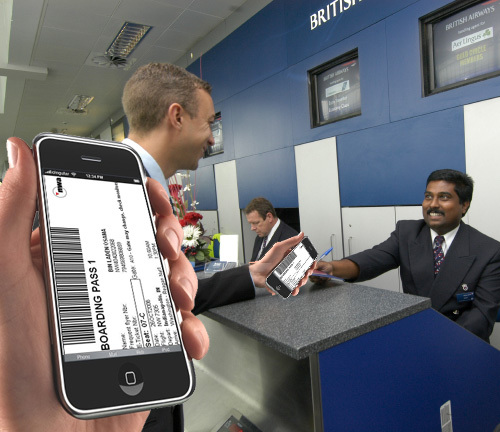You know what - change is a funny thing. For me, I can't wait untill I can watch all my movies and TV shows on demand instantly whenever I want without having to worry about which channel it's on, or which device I'm going to use to watch it - just click and watch. I can't wait till I can read my latest thriller I bought on my iPad while sitting at 35,000 feet depending (I'll still read the hard cover at the coffee shop though!). I can't wait till I can walk on to my next flight without needing a physical boarding pass, and I can't wait till I do my first payment by swiping my phone instead of my credit card (in fact I already have really). For me technology adoption is not only a way of life, but it's just plain cool.
I want to use my cell phone as a boarding pass
It is apparent, however, that some others amongst us, don't really like all these new fangled internet thingys and are a little challenged by change. I was in one of my regular bank strategy sessions the other week when I challenged the concept of free-to-air TV. In BANK 2.0 I predict that free-to-air TV can not really survive beyond about 5-7 years, because with TVC Ad revenue plummeting, beyond the state financing TV stations there is simply no viable business model that can sustain free-to-air. Why I raised this issue was, with only 18% of TVCs even having partial ROI these days, that marketing teams had to start thinking about moving away from traditional broadcast advertising as quickly as possible to point-of-impact. It was at this point I was challenged by a member of the audience who shouted out "you'll never get me paying for sports on TV!". In fact, and this might seem just a little bizarre to those of you who live in other countries, recently a lobby group has come up with a campaign to ensure just that in Australia - it's a website and massive TV/Print Ad campaign running in Australia at the moment called www.keepsportfree.com.au. I'm sorry - that's just ... ridiculous - think new mediums people!!
No matter how hard you lobby, no matter how hard we want things to stay the same, there is an inevitability about the way technology adoption changes consumer behavior, and hence the way it changes business, consumption and transactions. The most coveted skill in business today should be the ability to accurately read these trends and help your organization adapt accordingly.
I know I've discussed it before, but the launch of electronic stock trading by Charles Schwab is a great example. Looking back even Merrill Lynch probably realize that this was a positive game changer. The reality is it really had to go this way eventually, regardless of who took the helm. The fact that we can use advisory sites, online research, and analytics tools to give us real-time information even better than what most (not all) brokers could gives us, says what it's all about - where does the value lie? Not in a human interaction - but in the ability to execute the trade itself. Branches of banks face the same conundrum today.
For media content like TV shows, music, news it is likewise inevitable. Why should I wait until 8/9 central to watch that favorite series that I love, why can't I just schedule it for download as it's released online and then just watch next time I have a spare 40 minutes? Why would I physically walk into a music store to buy a CD - after all how can I get the tracks onto my iPod that way? Carry a newspaper on the train to read? Come on... These are all outmoded interactions; interactions that have no place in my life in the 21st Century.
You see these changes are inevitable. When Napster launched the recording industry went after the start-up and other similar businesses with the focus of a velociraptor, and for a time they thought they had succeeded. In 2008, however, 95% of songs were downloaded illegally, why? Mainly, because the recording industry failed to provide legal means to access this content online - they were too slow to adapt. When iTunes did provide a legal channel for the same - they made gazillions. In addition, artists actually can make more money in the digital age, while record companies provide minimal value in the value chain of the new world.
This is why I am choosing to embrace change. I don't want to keep my free-to-air TV, my physical newspaper and my gas guzzling SUV - I am ready for change, and I recognize it is inevitable. If I am prepared for change, then I'll undoubtedly capture those customers that are likewise ready for change, and they are the majority today. I can adapt or see my value chipped away until my business is worthless.
You want to join me?

